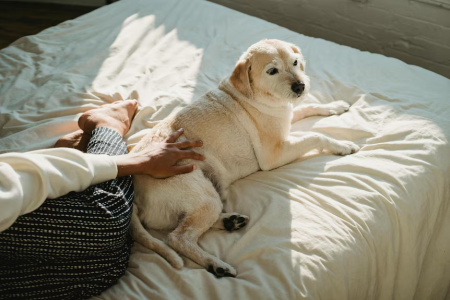The benefits and risks of sleeping next to your dog
By
ABC News
- Replies 0
Growing up, our family dogs always slept outside. But as a grown-up exercising free will, my pooches have known nothing other than the comfort of a king-size bed.
A survey of just over 1,000 Aussies in 2024 found almost half of pet owners let their pets sleep with them. This aligns with the numbers found by academic research from 2014.
Because dogs can bring us comfort and security, it's perhaps unsurprising data.
And while there are several benefits to keeping our pets close at night, there are a few minor risks to consider.

"During cold nights, Indigenous Australians were often reported to sleep alongside their dogs for warmth," the authors write.
"This practice is implicated in the common Australian expression 'three-dog night': the colder the night, the more dogs are needed to keep warm."
These days, letting dogs into the bed is more about them having become valuable family members, says animal behaviourist Kate Mornement.
She has noticed a spike in bed-sharing with pets since the pandemic, too.
"I suspect this is due to dogs providing us with companionship and emotional support during difficult times."
Our dogs enjoy co-sleeping, Dr Mornement says, because it's warm and cosy. And they associate that area in the home with positive things like affection and company.
Staphylococcus (associated with skin infections) and parasites such as round worms are some examples of health hazards associated with close contact between humans and pets.
But she says those risks are low, particularly if the animals are kept clean, are regularly de-wormed and have routine vet checks.
And the risks aren't that different from those linked with sharing a bed with another human.
"If that human is unwell, or carrying certain bacteria or parasites, you won't necessarily get that bug, but the risk is greater than if you were not in such close contact," Dr Heller says.
Allergies are also something to be aware of, as they may be accentuated by having pets in the bed.
To mitigate health hazards for those at risk, Dr Heller suggests training your dog to sleep at the end of the bed on a separate washable blanket.

Another showed that those who co-slept with pets took longer to fall asleep and were more likely to wake up tired.
"However, there were no significant differences found in total self-reported sleep length or feelings of tiredness during the day," the authors wrote.
Other research shows the disadvantages of human-animal co-sleeping are small compared to the social support and increased feelings of security it brings.
"Being on the bed has nothing to do with being the pack leader or dominant. They just want to be there because it's comfy."
The idea that dogs perceive themselves as higher in the pack hierarchy than you is based on dominance theory, which has been debunked.
That said, if a dog is showing aggression on the bed, she says it could be a sign of resource guarding (protecting something they care about).
"Dogs that are allowed to sleep on the bed are more likely to guard the bed as a resource, even from pets or from a partner."
She says they may show aggression to prevent other people or pets coming into the bed, but it can be resolved with training.
"It really depends on the person's past experiences with pets," she says, adding some people haven't had close bonds with animals growing up.
When it comes to intimacy, while some owners allow their dog to stay in the bedroom when they have sex, for those who want to create space, it can be trickier.
Dr Mornement says it can be confusing for the animal as to why they are allowed on the bed sometimes, and not others.
Thankfully, there are a number of ways to handle a nosy or put-out pet, including giving them a zone and distracting them with toys.
Ultimately, sleeping with your pet has psychological and social benefits, and low health and behavioural risks.
"We share a real closeness and very strong bond with our pets, that's why we've allowed them to come into our beds," Dr Mornement says.
By Kellie Scott
A survey of just over 1,000 Aussies in 2024 found almost half of pet owners let their pets sleep with them. This aligns with the numbers found by academic research from 2014.
Because dogs can bring us comfort and security, it's perhaps unsurprising data.
And while there are several benefits to keeping our pets close at night, there are a few minor risks to consider.

Sleeping next to our dogs brings feelings of comfort and security. But do they mess with our rest time? (Pexels)
A quick history lesson
Australian study, Should we let sleeping dogs lie… with us? shows human-animal co-sleeping is not new, having been widely recorded in ethnographies of Indigenous Australians."During cold nights, Indigenous Australians were often reported to sleep alongside their dogs for warmth," the authors write.
"This practice is implicated in the common Australian expression 'three-dog night': the colder the night, the more dogs are needed to keep warm."
These days, letting dogs into the bed is more about them having become valuable family members, says animal behaviourist Kate Mornement.
She has noticed a spike in bed-sharing with pets since the pandemic, too.
"I suspect this is due to dogs providing us with companionship and emotional support during difficult times."
Our dogs enjoy co-sleeping, Dr Mornement says, because it's warm and cosy. And they associate that area in the home with positive things like affection and company.
Minor health risks to consider
Dogs carry various bacteria and parasites, some of which can be transferred to humans (and also from humans to pets), according to veterinary health expert Jane Heller.Staphylococcus (associated with skin infections) and parasites such as round worms are some examples of health hazards associated with close contact between humans and pets.
But she says those risks are low, particularly if the animals are kept clean, are regularly de-wormed and have routine vet checks.
And the risks aren't that different from those linked with sharing a bed with another human.
Allergies are also something to be aware of, as they may be accentuated by having pets in the bed.
To mitigate health hazards for those at risk, Dr Heller suggests training your dog to sleep at the end of the bed on a separate washable blanket.

There are minor health risks to sharing a bed with your pet, not much different to sleeping with another human. (Pexels)
Sleep quality
Because dogs are active for about 20 per cent of the night, co-sleeping can cause "relatively mild reductions in overall sleep quality" for humans, a small Australian study found.Another showed that those who co-slept with pets took longer to fall asleep and were more likely to wake up tired.
"However, there were no significant differences found in total self-reported sleep length or feelings of tiredness during the day," the authors wrote.
Other research shows the disadvantages of human-animal co-sleeping are small compared to the social support and increased feelings of security it brings.
Who is in charge?
The belief that letting your pet sleep in the bed will make them more dominant is false, says Dr Mornement."Being on the bed has nothing to do with being the pack leader or dominant. They just want to be there because it's comfy."
The idea that dogs perceive themselves as higher in the pack hierarchy than you is based on dominance theory, which has been debunked.
That said, if a dog is showing aggression on the bed, she says it could be a sign of resource guarding (protecting something they care about).
"Dogs that are allowed to sleep on the bed are more likely to guard the bed as a resource, even from pets or from a partner."
She says they may show aggression to prevent other people or pets coming into the bed, but it can be resolved with training.
Disruptions to intimacy
Dr Mornement says in her consultancy work, couples will sometimes disagree about bed-sharing with a dog."It really depends on the person's past experiences with pets," she says, adding some people haven't had close bonds with animals growing up.
When it comes to intimacy, while some owners allow their dog to stay in the bedroom when they have sex, for those who want to create space, it can be trickier.
Dr Mornement says it can be confusing for the animal as to why they are allowed on the bed sometimes, and not others.
Thankfully, there are a number of ways to handle a nosy or put-out pet, including giving them a zone and distracting them with toys.
Ultimately, sleeping with your pet has psychological and social benefits, and low health and behavioural risks.
"We share a real closeness and very strong bond with our pets, that's why we've allowed them to come into our beds," Dr Mornement says.
By Kellie Scott








